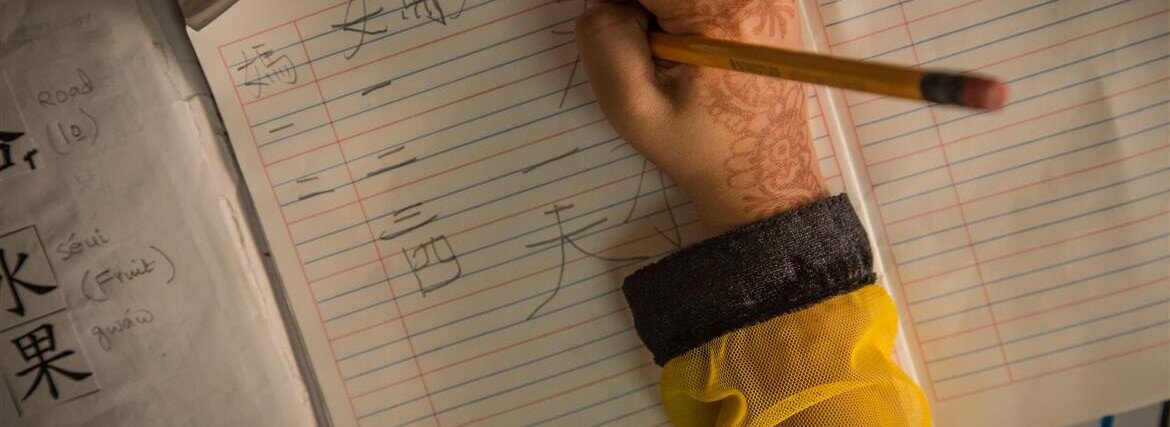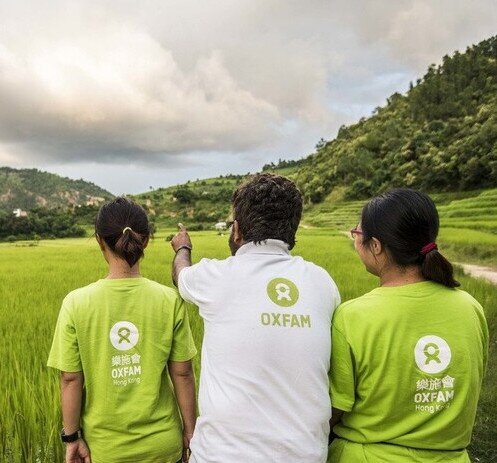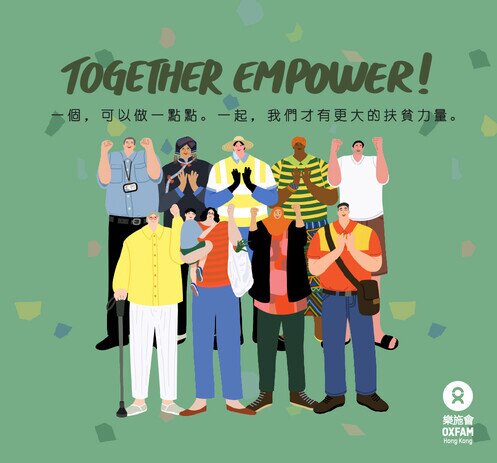This photo, taken by Ducky Tse, was first exhibited at the ‘Do you read me?’ photo exhibition.
The Situation
According to the 2016 report on poverty among ethnic minorities in Hong Kong, the poverty rate among South Asian children (29.1 per cent) is significantly higher than that of all children in Hong Kong (i.e. 15.3 per cent). With the former more than double than that of the latter, it is clear that a considerable number of ethnic minorities live in poverty.
Since many South Asian children have a limited grasp of Chinese, their career options as adults are often limited to ‘3D’ jobs, i.e. dirty, dangerous and demeaning jobs; these are often low-paying jobs too. As such, this fuels intergenerational poverty.
One of the most direct ways of enabling these children to escape poverty is by providing them the support necessary to become proficient in Chinese. Oxfam Hong Kong has thus been conducting research on how to better support non-Chinese speaking students’ Chinese learning as well as on government policies in this area, and are undertaking public education initiatives to make the needs of ethnic minorities more visible.
hOW WE'RE HELPING
Start from the Beginning – Chinese Supporting Scheme for Non-Chinese Speaking Students in Kindergarten (2020 – 2023)
Befriending the Chinese Language
Since 2015, Oxfam Hong Kong, the University of Hong Kong and the Education University of Hong Kong launched the ‘Start from the Beginning – Chinese Supporting Scheme for Non-Chinese Speaking Students in Kindergarten’ project. The project has entered into its 6th year and cover 96 kindergartens. It is also the first Pay-for-Success1 project in Hong Kong with cross-sector collaboration. The programme has been further enhanced to provide professional training to teachers and parental support on kindergarten primary transition, the new elements are:
• Enrichment curriculum: provide interactive enrichment classes for non-Chinese speaking children (build on the basis of learning Chinese as a second language which suits the need of NCS students).
• Learning and teaching packages: Develop a new set of teaching materials composed of original pictured stories, nursery rhymes, worksheet exercises and teaching realia (such as word cards, picture cards, learning tools and toys, etc).
• Dynamic Enrichment Learning Mode (DELM): Provide additional individual/group activity to NCS students during school hours. NCS students will learn Chinese in a systemic way through stories, songs and games.
• Teacher professional development: Apply train-the-trainer mode to equip teachers with teaching Chinese as a second language knowledge and strategies. We will also provide inter-school exchange opportunities and on the job training for teachers.
• Online learning community platform: An online learning platform will be built for resources sharing. A community will be formed through workshops, co-teaching, classroom observation and knowledge dissemination.
• Parent support: Organise a series of parents’ talk on primary one transition, station at kindergarten to help parents to fill primary one admission form, prepare videos on primary one admission and an overview of support to NCS students of primary schools (by district).
The PFS project has up to now supported over 1,200 NCS students and 170 teachers. The NCS students who joined this project have improved their reading and listening skills, and pronunciation in Chinese. Teaching resources have been uploaded to an online platform – which is free and publicly accessible –to benefit more NCS students.
This project was also awarded the Outstanding Social Service Awards by the Hong Kong Council of Social Service (HKCSS). Through the 2021 Best Practice Awards in Social Welfare, the project was recognised for its outstanding performance in the social service sector. The panel of judges included individuals from the social sector, charitable foundations, universities and the business sector. A total of 96 projects were adjudicated, and 10 projects won awards in the end.
Through the 2021 Best Practice Awards in Social Welfare, Oxfam’s project was recognised for its outstanding performance in the social sector. The award was presented by the Director of Social Welfare, Lee Pui-sze (first from the left).
1Pay for Success is also known as a Social Impact Bond (SIB). It is a public-private partnership which funds effective social services through performance-based contractual arrangements and enables governments to partner with high-performing service providers by using private investments to develop, coordinate or expand effective programmes. It leverages on investors’ risk-sharing to enable funding of more innovative or preventive interventions which are currently not yet covered in the government budget.
Overcoming the Language Barrier
_1560238230.jpg)
‘To live in Hong Kong, we must learn Chinese,’
-Khan Usra
The mother of two participants of our porject 'Start from the Beginning' , she is happy that her children study at one of the kindergartens implementing the pilot scheme.
Currently, there are about 451,000 people of non-Chinese descent living in Hong Kong. Without any support in Chinese language learning, however, many ethnic minority children find it difficult to pick up the language. Their lack of proficiency in Chinese often limits their job choices and contributes to the higher-than-average poverty rate among the ethnic minority population.
Oxfam has been working with the University of Hong Kong and the Education University of Hong Kong to implement the ‘Start from the Beginning – Chinese Supporting Scheme for Non-Chinese speaking Students in Kindergarten’ from 2015. Through pictures, stories, songs, experiential learning, group and individual learning, we aim to demonstrate effective ways of teaching ethnic minority children Chinese.
‘To live in Hong Kong, we must learn Chinese,’ said Khan Usra, a Pakistani mum of two who study at one of the kindergartens implementing the pilot scheme.
With her family set to stay here for the long haul, she sent her kids to a Chinese kindergarten so they could start learning the local language from a young age. ‘Lo see (the teacher) says my children are picking up Chinese very well [through this programme],’ she said.
Since the pilot scheme began two years ago, teachers and parents have seen much improvement; some kindergarteners even scored top marks in their Chinese exam.
With the success of this scheme, we’ve also been urging the Education Bureau to establish a Chinese as a second language curriculum, and provide sufficient resources and support to kindergartens that admit non-Chinese speaking students. We also encourage these kindergartens to ensure teachers are adequately trained.
More than just a job search service
'we’re happy to share that the students – who come from ethnic minority backgrounds – have gained a deeper understanding of childhood education through the lectures and internships.’
Young people from low-income and ethnic minority backgrounds often lack access to a wider range of employment opportunities, mainly due to their limited Chinese proficiency. This unfortunately makes it difficult for them to end the poverty they face. At the same time, the number of non-Chinese speaking students is on the rise every year, but many kindergartens do not employ non-Chinese speaking teaching assistants, or their teachers are not trained in this area.
Identifying these gaps, Oxfam Hong Kong launched the “Foundation Certificate in Early Childhood Care and Education for Non-Chinese Speaking Learners”. Through the programme, youths can explore a career path in early childhood education, while young ethnic minority children receive better support at school. The programme was awarded the Social Capital Builder Logo Awards by the Home and Youth Affairs Bureau’s Community Investment and Inclusion Fund!
The course spans a total of 80 hours of theoretical lessons (covering topics like the basics of early childhood care and education, classroom management and communication skills with parents) and 32 hours for an on-site internship. After completing the course, participants have access to one-on-one job matching services to help them enter the workplace.
The first batch of students are about to compete the course. In addition to gaining a deeper understanding of early childhood education, our students have also had the opportunity to practice what they learnt during their placements.
Oxfam’s Policy research and advocacy (selected)
*Report in Chinese only


_1669709296.png)


